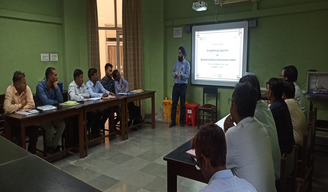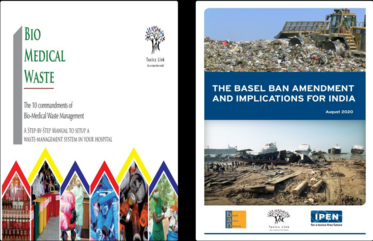INTERVENTIONS ELECTRONIC WASTE
Toxics Link has been actively campaigning, since 2003, on the issue of safe management of e-waste in the country through various researches, reports and awareness building exercises. Though India brought in a legal framework to manage this,the country is still struggling to understand the scale of this toxic waste issue and local feasible models. In the absence of an effective on-ground system, waste continues to flow in the informal sector, thereby polluting our soil, water and air and increasing our health risks.Thus, we continue to put our energy to improve things on ground and work towards a sustainable e-waste management system in the country. Some of our key initiatives are-
Research
Environment impact study: Studies suggest that currently 95 per cent of e-waste is being handled in the informal sector and most of the processes are rudimentary where crude waste processing techniques are adopted, leading to various health and environmental hazards. Toxics Link did a study to analyse the environmental impacts of recycling of e-waste in the informal sector.
For more details Click Here
Material flow study: One of the key strengths of Toxics Link is primary research and bringing forth information in the public domain. In the last few years, the organization has taken up the issues related to cross-contamination. Plastic and its contaminants like brominated flame retardants is one such issue, where the organization has carried out extensive field research to understand the plastic recycling market and the risks of contaminating the entire plastic chain with this toxic chemical. Lab analysis on recycled plastic material was also carried out to check the contamination and the concentration. Toxics Link has undertaken a material flow study to understand how leaded glass from e-waste is contaminating the entire glass recycling chain. The work on CRT is further continued where Toxics Link is trying to understand the import supply chain and gathering data on the fate of CRTs being imported.
For more details Click Here
Informal Sector: In India, informal e-waste recycling continues to operate even after eight years of E-waste (Management and Handling) Rules, 2011 and three years of E-waste (Management) Rules, 2016. Toxics Link has constantly been engaging itself with the informal E-waste sector. Its recent report ‘ Informal E-waste Recycling in Delhi: Unfolding Impact of two years of E-Waste (Management) Rules 2016’ has found crude processing of e-waste in 15 informal hotspots of Delhi, functioning without any health or environmental safeguards. The study revealed that the informal operations continue to poison human health and the environment through its improper processing operations in the e-waste capital of India. Based on the report, the regulatory agency took action, especially to close down illegal operations.
For more details Click Here
Extended Producer Responsibility: E-waste rules in 2011 (revised E-waste Rules 2016) brought in Extended Producer Responsibility (EPR) as a key principle to reduce the impacts associated with mismanagement of E-waste. Under EPR, the producers or the brands selling electronic and electrical equipment are meant to set up takeback system, create awareness among consumers and ensure that e-waste is collected and treated in an appropriate manner.
The latest version of our study “Time to Reboot” assessed 54 major electrical and electronic brands in India on the waters of Extended Producer Responsibility. The third report in the ‘Time to reboot’ series went beyond the legal mandates and assessed some parameters from the consumer perspective. Based on their performances, the Producers or the companies have been grouped into 4 categories, namely, Green, Blue, Yellow and Red- with Green as best and Red as worst.
For more details – Click Here
Policy Advocacy and Capacity Building
Toxics Link has been working on the issue of e-waste for more than a decade, and has fervently advocated for a separate regulation on E-waste in the country. The organization has been instrumental in getting the E-waste Management and Handling Rules (2011) notified in the country and subsequently E-waste Management Rules, 2016 which made the norms more stringent.
Currently, the organization is working on the various aspects by initiating policy conversations to bridge the gaps and address the inadequacies in the framework. The present intervention seeks to push for an effective implementation and compliance of the rule of 2016 as amended in 2018.Apart from this Toxics Link is also engaged in building the capacity of various stakeholders, especially at state levels. Some of our state interventions are done with local civil society organizations to help build their capacity and also to continue the campaign at the local level. These workshops help facilitate discussions and information exchange on E-waste rules and its implementation among the key stakeholders. .
We also work in close association with the policy makers and government authorities to push them for effective regulations and policies and its effective implementation.
Few of the recent initiatives in this are:
- Workshop Report-E-waste & Batteries
- E-waste – Creating Changes’ in Guwahati
- ‘Roadmap for Sound Management of E-waste in Kerala’ in Thiruvanantapuram
- National workshop on ‘Designing Take Back Systems for E-waste’ in Delhi
Setting up Models on Ground
Development of E-waste Management Plan for the State of Goa: Goa, one of the most pristine states in the country with highest GDP, is saddled with the e-waste problem. The e-waste rules had very limited impact on ground here and hence the waste is still managed in the state in an improper manner. There are several gaping holes in the form of lack of a collection network and infrastructure, effective awareness programs and a robust and transparent system etc.
Toxics Link is currently engaged with Goa Waste Management Corporation (GWMC) to develop an e-waste management plan for the state with an aim to fill in some of these gaps through e-waste assessment in the state and a plan for a feasible collection network covering the entire population. The assessment will include mapping of the current value chain of e-waste, e-waste category wise inventory and the knowledge, attitude and practices of the concerned stakeholders regarding the waste in the state. We will also facilitate the development of an e-waste collection network and facility in Goa.
Acting as a Watchdog
Toxics Link designed a study to assess one of the most important stakeholders – Producers on their extended producer responsibility under the E-waste Rules. The report raises serious concern on the current system and questions if it is time to reboot the system and find more effective ways for better e-waste management.
RTIs have been filed in Central Pollution Control Board (CPCB) and State Pollution Control Board (SPCB) seeking information on annual reports filed by producers.
Awareness Campaigns Lack of awareness among the various stakeholders has been a key bottleneck in safe management of e-waste. Toxics Link has been making all efforts to reach out to all the stakeholders, including the general public. The organization has produced short films and many information materials like flyers, posters, brochures targeted at students, professionals, government, etc.
School Programme:
Toxics Link has been organizing school awareness programmes across India. Children are the focus of the campaign because they are believed to be “agents of change” with the power to influence parents and promote awareness among the neighbours. Around 1400 schools have already been covered in ten states in the year 2011-12.The campaign covered 1,93000 students and 6,500 teachers. In 2013, almost 800 more schools were approached in 9 states namely, Delhi, Bihar, Kerala, Maharashtra, Odisha, Rajasthan, Sikkim, Tamil Nadu, Uttar Pradesh and West Bengal. The module of the programme is very interactive including game based activities for the children ensuring higher participations.
Nokia-Toxics Link Planet Ke Rakhwale
If you want to organize a school programme on e-waste, kindly contact us.

Collection System for Consumers:
As a part of the WEEE project, Toxics Link had set up fourteen (14) bins for collection of e-waste at important public locations and government offices in Kolkata. This was done to create awareness among the common public regarding e-waste and also give them an opportunity to dispose it in a responsible manner.
Toxics link in its endeavour to generate and foster awareness initiated an awareness generation campaign and E-waste Collection Drive in academic institutions and residential complexes during Durga Puja. A myriad of innovative ideas like installing e-waste recycling bins, banners carrying public awareness messages, drawing and poster competitions on the issues of environment and e-waste were also organized for children at various puja pandals, across the city…Read More
Toxics Link in collaboration with HRA e-waste Private Limited organized an ‘E-waste Awareness and Collection Drive’ in Pavitra Apartment, Vasundhara Enclave on 5th June 2014, the World Environment Day. The programme was supported by The Department of Environment, Govt. of Delhi…..Read More






